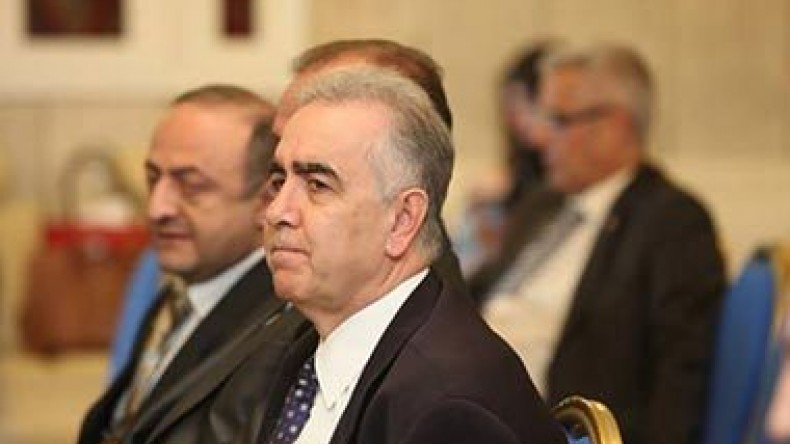
Author of UN report confirming the Armenian Genocide passes away
By Harut Sassounian
TheCaliforniaCourier.com
Benjamin Whitaker, author of a United Nations report qualifying the Armenian mass killings as genocide, passed away earlier this month at the age of 79 in London. The world lost a great humanitarian and a staunch supporter of minority rights.
I worked closely with Mr. Whitaker at the UN in Geneva, Switzerland, for several years. He served as the British expert on the Sub-Commission on Prevention of Discrimination and Protection of Minorities, while I represented the Indigenous World Association, a Native American non-governmental organization (NGO).
Mr. Whitaker was an activist lawyer, elected to the British Parliament from North London in 1966. He became executive director of the Minority Rights Group in 1971, publishing dozens of studies on minority groups around the world, including a trailblazing report on Armenians.
In 1975, Mr. Whitaker was appointed as British representative on the UN Sub-Commission on Prevention of Discrimination and Protection of Minorities, in the midst of a major controversy regarding a reference to the Armenian Genocide in a UN study. Rwandan Special Rapporteur Nicodeme Ruhashyankiko, author of the preliminary study, was pressured by Turkey to delete the reference to the Armenian Genocide.
To counter the Turkish pressures, a handful of Armenian activists, including this writer, successfully lobbied the UN Sub-Commission in 1978 to block the report after the reference to the Armenian Genocide was removed. I then asked Mr. Whitaker if he would be interested in becoming a Special Rapporteur to complete Ruhashyankiko’s aborted report. Mr. Whitaker agreed on condition that he would not do seek any votes for his appointment.
Given his impeccable reputation as a human rights activist, the Sub-Commission members overwhelmingly voted for Mr. Whitaker as the new Special Rapporteur with a mandate to prepare a “revised and updated report on the question of the prevention and punishment of the crime of genocide.” The only unhappy delegate was Turkey’s UN representative who knew that his government’s intimidating tactics on Mr. Ruhashyankiko would not work on Mr. Whitaker.
In August 1985, Mr. Whitaker presented to the UN Sub-Commission the revised and updated report, qualifying the Armenian Genocide as an example of genocide in the 20th century. After lengthy debates, Turkey failed in pressuring the Sub-Commission to delete the reference to the Armenian Genocide. By a vote of 14 in favor, one against, and four abstentions, the Sub-Commission adopted the report, thus confirming that the Armenian Genocide met the UN criteria for genocide.
Since then, Turkish denialists have engaged in blatant lies, claiming that there was no such vote and no such UN report! They even alleged that Farhan Haq, spokesman for the UN Secretary General, had told Turkish groups back in 2000 that the UN had “never approved nor supported a report that describes the Armenian experience as ‘genocide.’” I contacted Mr. Haq who told me that he was indeed aware of the report adopted by the UN human rights body which referred to the Armenian Genocide. He had simply told the Turkish groups that the UN General Assembly had not adopted a report on the Armenian Genocide.
Unfortunately, there has been very little effort by Armenians to publicize this critical UN report which acknowledges the Armenian Genocide. More surprisingly, in his UN General Assembly address in 2000, Pres. Kocharian called upon the UN to recognize the Armenian Genocide. The President’s aides had not informed him about the UN Sub-Commission report of 1985!
Since our UN days, I had the distinct pleasure of being in the company of Mr. Whitaker on several occasions. In the late 1980’s, we were both invited to Argentina by the local Armenian National Committee to deliver a series of lectures on the UN and the Armenian Genocide. In 2009, Mr. Whitaker kindly attended my presentation at the British Parliament on the Armenian Genocide and made gracious remarks about our past collaboration at the UN.
The Armenian Republic and Armenian communities worldwide should organize a fitting tribute to Mr. Whitaker, as 2015 is not only the Centennial of the Armenian Genocide, but also the 30th anniversary of the adoption of the UN genocide report.
There are three other members of the UN Sub-Commission who were extremely supportive during the adoption of the genocide report and who are still alive: Leandro Despouy of Argentina, Louis Joinet of France, and Mrs. Erica Daes of Greece. Despouy has already been decorated by the President of Armenia. Joinet and Daes deserve similar recognition by Armenia and the Diaspora!
Newsfeed
Videos






























